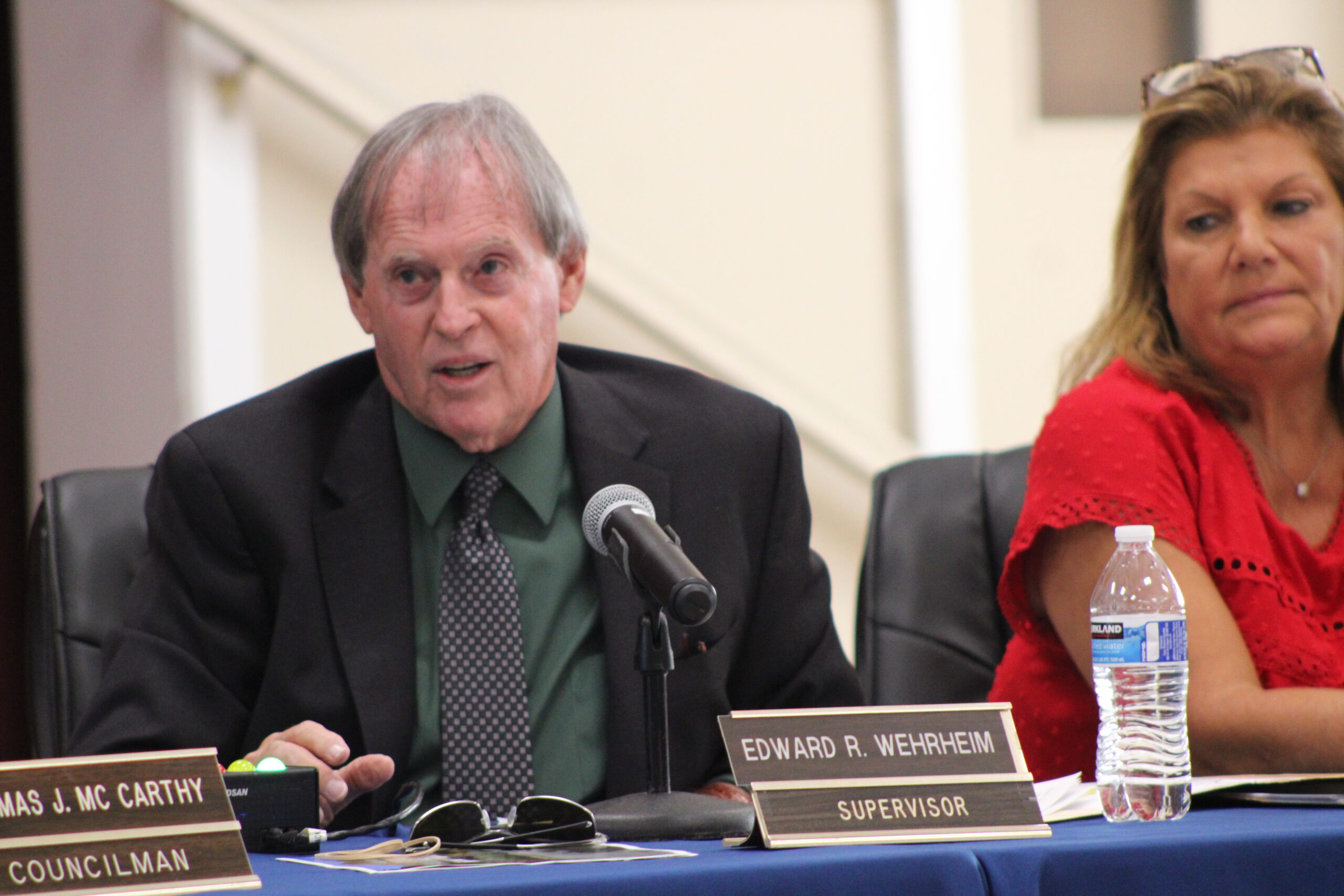Cover photo: Supervisor Wehrheim speaks to a constituent at Tuesday’s board meeting (Credit – Matt Meduri)
Smithtown’s Tuesday board meeting was held at the Eugene Cannataro Senior Center in St. James due to accessibility issues at Town Hall following devastating flooding brought by remnants of Hurricane Ernesto.
The board meeting was also unusual in that Supervisor Ed Wehrheim (R-Kings Park) engaged in a question-and-answer style of interaction with residents during the public portion, during which residents are allotted three minutes of speech that usually does not constitute input from the Town Council.
For months, residents have descended on Town Hall to make the Council aware of their opposition to the proposed railyard in Kings Park, as well as the application for an assisted-living facility on the historic Bull Run Farm property in St. James.
Wehrheim brought clarity on these hot-button issues, as some residents took to the microphone to question the Council on their support or opposition for said issues.
The divergence from the typical board meeting procedure began with concerns stated by Bob Semprini, President of the Commack Community Association, who read concerns and complaints from people in his community regarding the proposed rail yard, including, but not limited to, ending support for Republicans for local office, suggesting some members of the Town Council have “been there too long” and that “it’s time for a change,” and accusations of the Town Council “hiding something.”
“There is no application [for the rail yard before the Town Council],” said Wehrheim. “I can assure that when an application does arrive at the Town of Smithtown, all of the comments about the environment, the rail coming in, the noise, the trestle collapse, will all be addressed.”
Wehrheim added that “land use professionals” will go through the conventional processes of vetting the application against all standards before the Town takes a vote on it. He also said that such information has been distributed to the local papers.
The Messenger ran Supervisor Wehrheim’s letter to the public in our August 22 edition.
“We’re not land use experts,” Wehrheim said of himself and the Town Council. “But we have land use experts, and I can assure you that they will look at every single concern that every resident of Smithtown has. The comments will absolutely be considered before this board makes any decisions on moving forward, if and when there is an application.”
Wehrheim cautioned that if the Town Council “prejudges” an application, the Town will “get sued for a lot of money.”
Wehrheim referenced a smaller example of the legal jeopardy into which the Town could suddenly be thrust by describing the application for the Sonic restaurant in Nesconset across from the Smith Haven Mall.
“The residents of Country Pointe did not want the Sonic,” said Wehrheim, who was a councilman at the time. “The Board started talking about not approving it. The property owner went to court, and the court decision was that we cannot predetermine an application based on residential opposition. You have to allow them the process by law. We did, but the residents were still not happy. They appealed the decision and the homeowners association raised $30,000 on their own. They lost and the Sonic was built.”
Wehrheim invoked the cautionary tale to relay to the public that the board often cannot voice support or opposition for a project until it goes through the various independent government boards before reaching the Town Council.
Wehrheim also said that the project’s developer, Toby Carlson, has been “put through the ringer” already with regards to the Surface Transportation Board’s (STB) recent approval to extend the 5,000-foot rail line for commercial use. Townline Rail Terminal, LLC proposed the line, which would run one train in and one out along the LIRR Port Jefferson line. The purpose of the railyard would be to mitigate the buildup of construction debris prompted by the end-of-year closure of the Brookhaven landfill.
“I live about 1,200 feet from that line. I’m a lifelong resident of Kings Park, and I understand everybody’s concerns. I would never do anything in my office that would destroy the community,” said Wehrheim. “There is no application at this time; I don’t know whether Mr. Carlson is putting one in or not. If the plan doesn’t work environmentally, planning-wise, or engineering-wise, then he won’t be able to build.”
A Kings Park resident thanked Wehrheim for his answers on the rail yard, but also stated that Wehrheim and the Town Council have vocally supported the project. Wehrheim countered this claim by asserting that Smithtown has only supported a plan of shipping construction debris off Long Island via rail, rather than hundreds of trucks making daily trips, not the Kings Park rail yard project specifically.
“I supported that concept, and that’s based on meetings from the supervisors association, meetings with the State DEC, and with federal officials,” said Wehrheim.
The resident’s concern also includes the shipment of ash from the landfill and the recent sale of Winter Brothers to Waste Management, a national carrier of ash and construction debris.
Wehrheim responded by saying that as plans change, the municipalities’ priorities must also change. He said that the Town of Brookhaven might be looking at a one-to-two-year extension from the State Department of Environmental Conservation (DEC) to continue burying ash in the Yaphank facility.
“A lot of things change, there’s a lot in motion,” said Wehrheim. “Waste Management is a multi-billion dollar conglomerate that bought up everything. Maybe there will be no market for Mr. Carlson to put a project together.”
Another Commack resident questioned the Council on hazardous waste and the Town’s oversight of such transfers, namely as it pertains to environmental concerns, stating that the “federal government doesn’t care.”
“We will have control of that [hazardous waste transfers], because the Town of Smithtown and New York State DEC, which Mr. Carlson operates under, control the Carlson property,” said Wehrheim. “They could ship in hazardous materials, but those materials would sit in a railroad car because it would violate the law to unload it into a truck on that property.”
Wehrheim also cautioned that if Toby Carlson turns the entire fifty-acre parcel into Townline Rail property, rather than Carlson Corp. property, the federal government would control the whole fifty acres thereby negating control by the town.
“We’re doing everything in our power to make sure that that doesn’t happen, because then we would have a problem,” said Wehrheim.
Wehrheim told attendees that he and the Town Council “converse about this [rail yard] every single day.”
A Fort Salonga resident took issue with Wehrheim’s aforementioned letter. The Supervisor clarified the letter was intended for “unsubstantiated rhetoric” against the Town Council over the rail yard, namely questions of how Wehrheim and the Council can “sleep at night,” or “live with themselves” over the proposal, even going as far as to imply the Council is harming children who live near the Carlson property.
“To institute that this Board, myself, or anybody sitting here, would do anything to harm the life of a child is ludicrous,” said Wehrheim. “Those comments required a response because we do everything possible to support the residents.”
Wehrheim also addressed concerns of heavy development along Old Northport Road, stating that the current slate of industrial properties was a “mistake” made by Smithtown officials in the 1950s and 1960s.
“All thirty of those properties operated illegally at one time, because the Town Board sent all the heavy industry to that location because there was nothing there,” said Wehrheim. “They then allowed subdivisions to be built right up against the industry. In my opinion, that was a mistake. We’re trying to clean up that entire corridor from Indian Head Road to Fort Salonga.”
Wehrheim mentioned plans for a Starbucks, the recently built daycare center, the solar farm, a proposed soccer academy, and an orthopedic medical center.
“Those are the things we’re trying to bring to the community as opposed to asphalt plants, brick-making facilities, and rock-crushing facilities,” said Wehrheim.
A St. James resident brought up the ongoing legal battle between the Town and the developer who has proposed an assisted-living facility at the Bull Run Farm property. The Town’s reticence on the issue has been required during litigation in federal court. The developer is seeking a special exemption for the property that, under the current Master Plan draft, never existed in the Residential zoning. The developer is suing the Town over a Fourteenth Amendment right violation against “future residents.”
“We denied that special exception, and as a result of that, the developer felt the need to sue us,” said Wehrheim. “I have every faith in our attorneys that we will fight that. There isn’t anyone on this board who supports that project.”
After their comments and conversations with Supervisor Wehrheim, residents thanked Wehrheim and the Board for their input and stated that they “felt better” about the projects now knowing the Town’s positions on some of the most controversial proposals in Smithtown this year.
Wehrheim quipped that he violated his “three-minute” rule, but felt it was necessary to allay fears and concerns of the public.
The Town of Smithtown and the Supervisor personally will make time daily for Residents who have any questions or concerns. The Town Board Meetings have a public comment period, however it is not the traditional venue for a back and forth response. Residents are encouraged to email the Town if they require answers in a timely manner. Emails are public record and Residents may request that their emails be entered into the record of any board meeting subject or agenda item.







